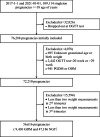Weight progression and adherence to weight gain target in women with vs. without gestational diabetes: a retrospective cohort study
- PMID: 37442957
- PMCID: PMC10347803
- DOI: 10.1186/s12884-023-05832-x
Weight progression and adherence to weight gain target in women with vs. without gestational diabetes: a retrospective cohort study
Abstract
Background: Weight management has been an important component of the service in obstetric care offered to pregnant women. Current gestational weight gain recommendations were primarily for the general obstetric population, raising concern about the applicability to women with gestational diabetes mellitus (GDM). We aimed to assess the difference in weight progression and adherence to the recommended gestational weight gain targets between women with gestational diabetes mellitus (GDM) and women with normal glucose tolerance (NGT).
Methods: This was a hospital-based retrospective study of 56,616 pregnant women (9,430 GDM women and 47,186 NGT women) from Guangzhou between 2017 and 2021. The average change in weight progression was estimated based on serial weight measurements throughout pregnancy, using a mixed effects model with a random intercept to account for repeated measures of the same individual.
Results: Women with GDM gained less weight (12.07 [SD 5.20] kg) than women with NGT (14.04 [SD 5.04] kg) throughout pregnancy. Before OGTT, a small difference was observed in the average change in weight progression between the two groups (GDM, 0.44 kg/week vs. NGT, 0.45 kg/week, p < 0.001), however, this gap widened significantly after the test (0.34 vs. 0.50 kg/week, p < 0.001). GDM individuals were identified with an approximately 4-fold increased proportion of insufficient weight gain (41.1% vs. 10.4%) and a 2-fold decreased proportion of excessive weight gain (22.6% vs. 54.2%) compared to NGT individuals. These results were consistently observed across different BMI categories, including underweight (insufficient: 52.7% vs. 19.9%; excessive: 15.6% vs. 35.3%), normal weight (insufficient 38.2% vs. 7.4%; excessive: 22.2% vs. 57.3%), and overweight/obese (insufficient: 43.1% vs. 9.8%; excessive: 30.1% vs. 68.8%).
Conclusion: Weight progression varied significantly between GDM and NGT individuals, resulting in a substantial difference in identifying insufficient and excessive weight gain between the two groups under current gestational weight gain guidelines.
Keywords: Gestational diabetes mellitus; Gestational weight gain targets; Overweight and obesity; Weight progression.
© 2023. The Author(s).
Conflict of interest statement
The authors declare no competing interests.
Figures



Similar articles
-
Low Gestational Weight Gain in Women With Gestational Diabetes Is Safe With Better Metabolic Profile Postpartum.J Clin Endocrinol Metab. 2023 Feb 15;108(3):665-679. doi: 10.1210/clinem/dgac599. J Clin Endocrinol Metab. 2023. PMID: 36228141
-
THE ASSOCIATION OF GESTATIONAL WEIGHT GAIN AND ADVERSE PREGNANCY OUTCOMES IN WOMEN WITH GESTATIONAL DIABETES MELLITUS.Endocr Pract. 2019 Nov;25(11):1137-1150. doi: 10.4158/EP-2019-0011. Epub 2019 Aug 15. Endocr Pract. 2019. PMID: 31414907
-
Late-pregnancy dysglycemia in obese pregnancies after negative testing for gestational diabetes and risk of future childhood overweight: An interim analysis from a longitudinal mother-child cohort study.PLoS Med. 2018 Oct 29;15(10):e1002681. doi: 10.1371/journal.pmed.1002681. eCollection 2018 Oct. PLoS Med. 2018. PMID: 30372451 Free PMC article.
-
Excessive gestational weight gain in the first trimester is associated with risk of gestational diabetes mellitus: a prospective study from Southwest China.Public Health Nutr. 2020 Feb;23(3):394-401. doi: 10.1017/S1368980019003513. Epub 2019 Dec 20. Public Health Nutr. 2020. PMID: 31858951 Free PMC article.
-
Screening and diagnosing gestational diabetes mellitus.Evid Rep Technol Assess (Full Rep). 2012 Oct;(210):1-327. Evid Rep Technol Assess (Full Rep). 2012. PMID: 24423035 Free PMC article. Review.
Cited by
-
Gestational weight trajectory and early offspring growth differed by gestational diabetes: a population-based cohort study.Nutr Diabetes. 2025 Mar 12;15(1):10. doi: 10.1038/s41387-025-00365-y. Nutr Diabetes. 2025. PMID: 40075061 Free PMC article.
-
Reconsideration of lowering gestational weight gain guidelines in pregnant women diagnosed with gestational diabetes: evidence from a Belgian study.BMC Med. 2025 Mar 18;23(1):165. doi: 10.1186/s12916-025-03992-5. BMC Med. 2025. PMID: 40102908 Free PMC article.
References
-
- Qi Y, Sun X, Tan J, Zhang G, Chen M, Xiong Y, et al. Excessive gestational weight gain in the first and second trimester is a risk factor for gestational diabetes mellitus among women pregnant with singletons: a repeated measures analysis. J Diabetes Investig. 2020;11(6):1651–60. doi: 10.1111/jdi.13280. - DOI - PMC - PubMed
MeSH terms
Substances
Grants and funding
LinkOut - more resources
Full Text Sources
Miscellaneous

